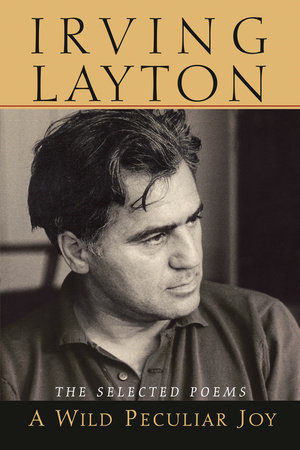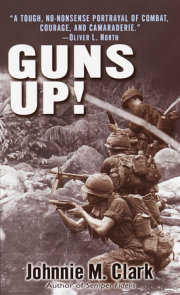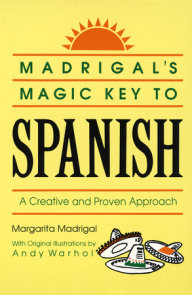READERS GUIDE
Introduction
A Wild Peculiar Joy is Irving Layton’s poetic testament. Hailed as the great lyric poet, Irving Layton has come to be known as one of Canada’s most powerful, groundbreaking voices, an important and influential writer whose distinguished career spanned almost forty-five years. By turns passionate and grave, joyous and apocalyptic, his beautifully crafted poems are illuminated by a strong social and political conscience, and an intensely humanistic view of the world. This is poetry that is timeless and universal. Drawn from his entire body of work, and now reissued in this handsomely redesigned volume, this edition includes a new introduction by Sam Solecki, and selected short excerpts from Irving Layton’s writings on the craft of poetry. A Wild Peculiar Joy once again makes available to readers the poetry of Irving Layton and stands as the author’s definitive selected.Questions and Topics for Discussion
1. Irving Layton has always made large claims for the importance of poetry. He would even agree with Wallace Stevens’s challenging comment that “After one has abandoned a belief in god, poetry is that essence which takes its place as life’s redemption.” What is your view of this ambitious assertion? Do you think that Layton’s poetry answers its challenge? Consider “The Birth of Tragedy” [p 1], “In the Midst of My Fever” [p 21], “The Improved Binoculars” [p 32], “On Seeing the Statuettes of Ezekiel and Jeremiah in the Church of Notre Dame” [p 43], and “Whatever Else Poetry Is Freedom” [p 56]
2. While Layton has spent all but two years of his life in Canada – he was born in Romania – you will probably have noticed that few of his poems are influenced by other Canadian poets. Instead we find poems addressed to poets in the European tradition: “Heraclitus” (a philosopher-poet) [p 105], “Epistle to Catullus” [p 254], “Yeats at Sixty-Five” [p 267], “Boris Pasternak” [p 258], and “Paul Verlaine” [p 290]. If you didn’t know that he is a Canadian poet, if, let’s say, you read him in Chicago in an American edition, would you be able to tell that he belongs in Canadian literature?
3. When Al Purdy visited Irving Layton at his house in Montreal in 1955, he noticed that the poet had a small shrine to the English novelist and poet D.H. Lawrence, who was described by one of his biographers as “The Priest of Love” because so much of his work deals with love and sex. This is also true of much of Layton’s work. What do you think are the essential characteristics of his love poems?
4. Why do you think that so much lyric poetry and song from Egypt in the second millennium – through the Biblical “Song of Songs,” the medieval troubadours, Renaissance songs and sonnets, and contemporary popular music – deals with love?
5. A large number of Layton’s poems deal with love or are addressed to women – “Look, the Lambs Are All Around Us!” [p 16], “The Day Aviva Came to Paris” [p 93], “Out of Pure Lust” [p 238]. What are their distinctive characteristics? How do they compare with the love poems of Catullus, Donne, Pushkin, Neruda? Why do you think some feminist literary critics have objected to them?
6. Layton’s prefaces to his various collections are often brief, polemical manifestoes about his view of poetry. In 1963, for instance, we find the following: “What insight does the modern poet give us into the absolute evil of our times?… The utter wickedness of Nazism and National – Communism? There is no poet in the English-speaking world who gives me the feeling that into his lines have entered the misery and crucifixion of our age.” Do his poems answer this challenge?
7. Despite Layton’s agreement with Shelley’s assertion that poets are the “unacknowledged legislators of the world,” should we expect poetry to do what might be called the work of non-creative writing?
8. One of Layton’s favourite quotations comes from the Russian poet Marina Tsvetayeva: “In this / Most Christian of worlds all poets / Are Jews” (“Poem of the End”). Keeping Layton’s poetry in mind, how do you think he interprets these provocative lines? In what sense are poets like Margaret Atwood or Michael Ondaatje “Jews”?
9. Samuel Taylor Coleridge defined poetry as “the best words in the best order.” Pretend for a moment that you are a critic or Layton’s editor: Are there any lines that you would change? Why?
10. Every writer has what might be called his or her dominant figure in the carpet, a recurring set of themes, concerns (even obsessions), images, figures of speech, and tricks of the stylistic knife. What are Layton’s?
11. What similarities and differences do you perceive between animals in Layton’s poems (“The Bull Calf” [p 29], “A Tall Man Executes a Jig” [p 83], “Cat Dying in Autumn” [p 62]) and in the poems of, say, Rilke (“The Panther”), D.H. Lawrence (“The Snake”), Elizabeth Bishop (“The Fish”), Margaret Atwood (“The Animals in that Country”), or Michael Ondaatje (“Loop”)?
12. If you were asked to edit an anthology of modern poetry in English (1950–2000) and had to restrict yourself to five poems from each poet, which poems of Layton’s would you choose? To give you a point of departure, I’ll tell you that for The New Oxford Book of Canadian Verse in English, Margaret Atwood selected “The Cold Green Element” [p 34], “The Improved Binoculars” [p32], “The Fertile Muck” [p 46], “From Colony to Nation” [p 45], “For Mao Tse-Tung: A Meditation on Flies and Kings” [p 69], “A Tall Man Executes a Jig” [p 83], “For Musia’s Grandchildren” [p 108], and “Grand Finale” [p170].
13. Does Layton’s account of “How a Poem Moves” in the lyric of that title reflect the manner in which his poems “move” or unfold [p186]?
14. For much of his career Layton was a very popular public poet, and his readings often attracted large audiences. Do you think that any of his poems gain something from being read aloud, declaimed publicly instead of being read silently, in private? On the other hand, are there lyrics that would lose something if performed?
15. Reflecting on the relationship between art and the genocide of the Jews during the Second World War, the German social and cultural critic T.W. Adorno suggested that “It is barbarous to write a poem after Auschwitz.” Think of “after” as also including “about” and ask yourself why Adorno might have made this statement.
16. Still keeping Adorno and the Holocaust in mind, what has Layton’s response been to the latter? Think of poems like “To the Victims of the Holocaust” [p 144], “After Auschwitz” [p 145], “Midsummer’s Dream in the Vienna Stadtpark” [p 140], “For 7515-03296” [p 141],“The Slaughterhouse” [p 177]. Does Layton’s view of poetry’s relationship to the Holocaust have anything in common with Anne Michaels’s Fugitive Pieces, the paintings of Samuel Bak, Primo Levi’s memoirs or Roman Polanski’s The Pianist?
17. Coextensive with the poems about the Holocaust are the poems in which Layton offers his critique of Christianity (“For My Brother Jesus” [p149], “Xianity” [p 153], “The Galilean” [p 155]). What aspects of the Christian religion does he find troubling? Is he concerned with just Christianity, or is his argument with religion in general?
18. Though many of Layton’s poems deal with what he calls “the absolute evil of our times” and enact a tragic vision, he nevertheless portrays himself as a Dionysian and life-affirming poet. Do you sense a fundamental contradiction here, or is this just a paradox that disappears when we look at Layton from a different point of view?
19. There are as many reasons for reading poems as there are for writing them, but if someone asked you whether or not they should read Layton, on what basis would you recommend his work? Its passionate engagement with important issues, its sensuality, its poetic voice, its vision of life?
20. W.H. Auden famously asserted that “poetry makes nothing happen.” Do you think Layton would agree? If you think that he would disagree, what form would his disagreement take. In other words, what sort of things would he expect poetry to “make happen”?
21. Keeping the previous question in mind, would you call Layton a political poet? In what senses of the word can a poet be “political”?
22. If you were taking a class in poetry taught by Irving Layton, what kind of teacher would you expect? What aspects of a poem would he emphasize? What would he say about poetry in general? Would he have a “theory” of poetry, or a poetics?
23. There’s no doubt that Layton’s life is the source of much of his poetry, and yet one senses that he would be out of place among the so-called “confessional” poets Robert Lowell, John Berryman, Anne Sexton, and Sylvia Plath. Take a look at some of the following poems and see if you can decide why this is so: “Now That I’m Older” [p 23], “Woman” [p 53], “The Day Aviva Came to Paris” [p 93], “Late Invitation to the Dance” [p 218], and “Nostalgia” [p 291].
24. If you have read either several of Layton’s books or A Wild Peculiar Joy: The Selected Poems, can you detect any significant changes or development in the poet’s concerns or in his style (diction, verse forms, figurative language, slang, lineation, etc.)?
25. Read “A Tall Man Executes a Jig” [p 83] – a poem considered by many readers to be among Layton’s finest – jot down some thoughts about it, and then compare your interpretation to Layton’s, which appears on page 330 of A Wild Peculiar Joy. Do you think that a poet’s comments about his work should carry a special authority? Is it possible that a poet or novelist might misread or misinterpret his or her work? What might be the cause?
26. Al Purdy, who owed a great deal to Layton’s guidance and example, often said that a poem should leave a reader with a sense of “being alive.” Do you think that Layton would agree with this? Which poems would you cite in evidence?
27. Poetry, like all imaginative writing, is enmeshed with our desire to remember, to resist what Shakespeare calls “death and all oblivious enmity” (sonnet 55). T.S. Eliot even goes so far as to suggest that every poem is in some sense an epitaph. This has always been an important theme in Layton’s work, most obvious in his elegies (see the one for his mother, “Keine Lazarovitch: 1870-1959” [p 79]). In what other kinds of poems do you see memory playing a role or the poet showing an awareness that memory is central to his engagement with life and art?
28. When a poet writes in the first person – “me happiest when I compose poems” – we are usually tempted to think that he or she is speaking directly to us. We imagine Robert Frost, for example, as an avuncular figure muttering to himself and us, “Whose woods these are I think I know.” And yet, a poem is a work of art, each part of which, including the poet’s voice and persona, has been shaped in response to the demands of art. We might say that a poem is a compromise between the demands of life and the conventions of art. Is Layton’s speaker or persona always the same, or does the speaking “I” have different voices and selves?
29. Though Layton expresses himself for the most part in lyrics written in the first person, few poets refer as often to their community or society. What is his view of the poet’s relationship to the public world around him?
30. Read “Composition in Late Spring” [p 19] and then jot down some questions and responses that the poem provoked in you. Compare them to the following responses written by Al Purdy: “Why does the writer feel so exultant that the downtown street and people seem so different to what they usually are? Does this seem to you similar to a basic personality change? Or would the writer generally be the sort of person he describes himself to be in the poem? Are the “damned ones” those who don’t feel as Layton does? If so, do you think they should be damned for this reason? Why do you think Layton feels he has defeated death?” Do Purdy’s questions tell you anything about him?
31. The Nobel Prize for Literature is rightly regarded as the most important and prestigious literary prize in the world. Many of the poets who have won it – T.S. Eliot, Eugenio Montale, Czeslaw Milosz – are considered among the major literary figures of their time. Irving Layton was twice nominated; what aspects of his work do you think were emphasized by those who nominated him? Do you think that there is a Canadian writer who deserves the Nobel? If you think there is, what aspects of his or her work would you emphasize if you were to write the nominating letter?
Reading guide courtesy of Sam Solecki
About this Author
Irving Layton was born in 1912 and has lived most of his life in Montreal. One of Canada’s most highly celebrated and prolific poets, having authored over forty books of poetry, many of which have appeared in translation, Layton has been the recipient of numerous awards for his poetry and for his continuing contribution to Canadian literature. He was twice nominated for the Nobel Prize for Literature.Suggested Reading
William Blake, The Marriage of Heaven and HellCatullus, The Poems of Catullus (tr. Charles Martin)
Leonard Cohen, Selected Poems
Frank Davey, “Irving Layton,” Oxford Companion to Canadian Literature (eds. Toye and Benson)
D. H. Lawrence, Look! We Have Come Through!, Birds, Beasts and Flowers, “A Propos Lady Chatterley’s Lover”
Irving Layton, Engagements: The Prose of Irving Layton, Waiting for the Messiah, Wild Gooseberries: The Selected Letters of Irving Layton
Primo Levi, If This Is a Man
Osip Mandelstam, Selected Poems (tr. Brown and Merwin)
Eli Mandel, Irving Layton
Anne Michaels, Fugitive Pieces
Friedrich Nietzsche, The Birth of Tragedy, The Genealogy of Morals, Twilight of the Idols
Sam Solecki, “Introduction,” A Wild Peculiar Joy: The Selected Poems of Irving Layton
Wladyslaw Szpilman, The Pianist




















